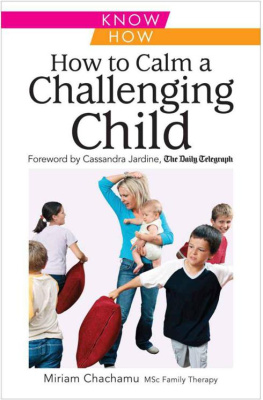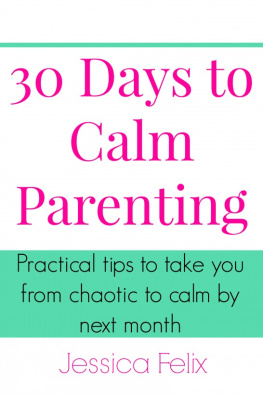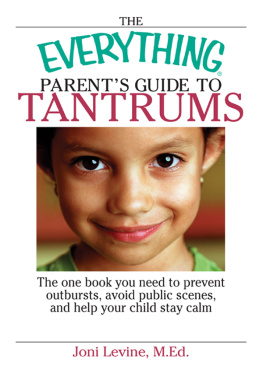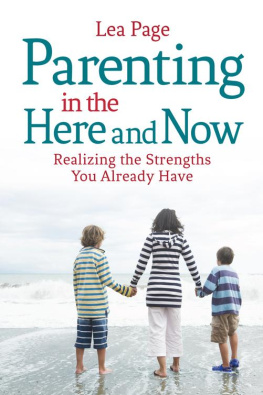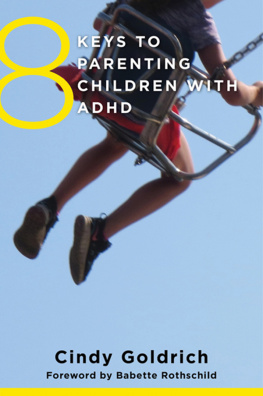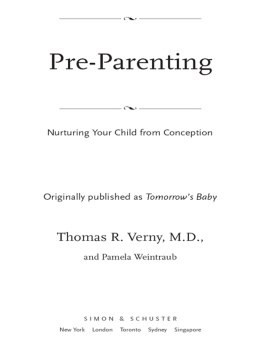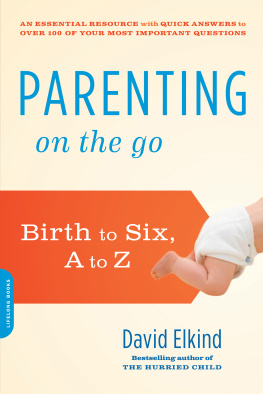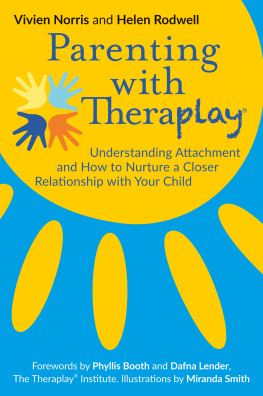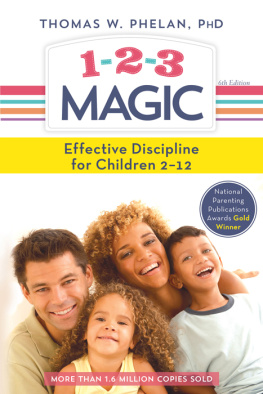Copyright
First published in Great Britain in 2008 by W. Foulsham & Co. Ltd
Copyright 2008 Miriam Chachamu
Cover photograph Superstock
A CIP record for this book is available from the British Library
The moral right of the author has been asserted
All rights reserved
Epub ISBN 9780572040192
Kindle ISBN 9780572040185
Book ISBN 9780572034955
The Copyright Act prohibits (subject to certain very limited exceptions) the making of copies of any copyright work or of a substantial part of such a work, including the making of copies by photocopying or similar process. Written permission to make a copy or copies must therefore normally be obtained from the publisher in advance. It is advisable also to consult the publisher if in any doubt as to the legality of any copyright which is to be undertaken.
W. Foulsham & Co. Ltd
Capital Point, 33 Bath Road
Slough, Berkshire
SL1 3UF, England
www.foulsham.com
Table of Contents
Foreword
Every honest parent will admit that there are moments when their children drive them to distraction. Other peoples children seem to go to bed without a fuss, eat the food they are given and clear up when they are asked; your own children, however, seem uniquely grumpy and unco-operative. As the children get older, the little temper tantrums that were once sweet expressions of toddler independence come to seem like symptoms of a deep malaise and the little voice inside your head that has been telling you, Hey, Im the best mother that ever lived suddenly changes tone. You are making a mess of this, it says as you burst into tears.
At such moments what you need is a kindly and wise person to talk to, someone who has been through these dramas and can prod you gently into behaving a little better yourself so that your children can, in turn, learn to be calm and co-operative. I was fortunate that when I hit parenting bottom, I came across the New Learning Centre and Miriam Chachamu who was working there.
When I signed up for a course of parenting classes with Miriam, my children were aged from 11 to two. Individually I adored them, of course, but as a group all they ever seemed to do was squabble. Frazzled and over-tired from running a home and working full-time, I remember feeling pessimistically that short of sending me on a long rest cure there was no way she could help. Nevertheless, I decided to go to a couple of classes just in case I could learn from them. Soon I found that the weekly sessions were not only fascinating but indispensable.
In part, it was Miriams personal blend of cheerfulness and sympathy that made a difference. She was open about admitting that she too had once feared that she was nothing like the parent she had wanted to be: memorably, she admitted to the shame of once having pushed her daughter out of bed in frustration because she wouldnt get up after numerous reminders and threats. Such fellow feeling from one who now seemed like everyones idea of a dream cosy mummy was very reassuring.
But her group sessions gave me more than just companionship in my self-doubts. Each week the group would explore a common problem it might be dealing with fights or managing children who wouldnt stay in their own beds and look at ways to handle the situation better. After every class each of us had homework to do: we had to address a situation differently and see if we achieved a different result. Week after week we had improvements to report and our confidence grew.
Im very glad now that she has found the time to make her unique brand of wisdom into a book.
Cassandra Jardine Mother of five children,
Daily Telegraph journalist and author of
How to Be a Better Parent
and Positive Not Pushy
Introduction
Becoming a parent is one of lifes most profound experiences. No matter how much you read about it, think about it or talk about it, nothing can prepare you for the intensity of feeling that most people experience when their child is born. Suddenly a tiny, helpless baby is totally dependent on you. From this point on, you will always have to balance your own wants and needs with the wants and needs of your child.
You probably started out with lots of hopes and dreams. A few years on, your family life may typically look more like this:

As your children grow up, their needs become more complex. They need your love, care, attention, time, energy, patience, knowledge and wisdom as well as some practical help with getting dressed, brushing their teeth, preparing food, doing their homework and being in the right place at the right time.
Many new parents have only distant memories of their own childhood, and not much experience of living with children. They are not sure what to expect and how to deal with the everyday challenges of raising children. Extended families are not always around, and friends are busy trying to cope themselves.
I believe that to manage the chaos effectively and meet everyones needs, we cant just rely on love and good intentions. We need a good understanding of our childrens perspective and of family dynamics, together with practical skills skills that can be learned.
This guide is not a child-rearing manual and I do not see myself as a know it all expert. However, I have worked with many families as well as having raised my own three children. The ideas and skills in this book have helped many parents to communicate better and experience more affection towards their children, reducing arguments and stress. I hope they may be useful to you too.
This book is designed for parents of children aged from about two (or whenever they understand some language) up to preteenage years. Much of what you read about can be effective with teenagers and adults, although you will need to adjust your language accordingly. My belief is that almost anyone who has contact with children will find new ideas and useful tips in this book, whether they are parents or not.
The practical skills covered in Part 2 focus mainly on problem areas, because this is what parents look for help with! But, of course, in every family, there is plenty that goes right. Your children may be happy to get up in the morning, eat a variety of healthy foods, or get on well with each other. Congratulate yourself on what is going right, even if, sometimes, other people think that you should do things differently. There is no single, correct way to raise children. As long as all family members are happy, and you as parents feel that your values are being upheld, you are doing fine!
What will you gain from reading this book?
- A better understanding of your childrens perspective and needs. This is the first essential step towards improving your relationships and having a happier home.
- Positive communication skills to help you put this understanding into practice. You will find ideas to motivate your children to be their best happy, confident, secure and respectful of others.
- Strategies to deal with everyday problems as they arise.
I can promise you that if you take on the ideas in this book, and put your new communication skills into practice consistently, your family life will be transformed. There will be more co-operation and less stress in your home, more laughter and fewer tears.

